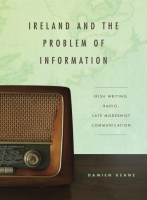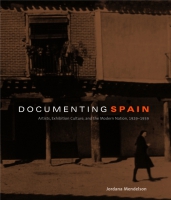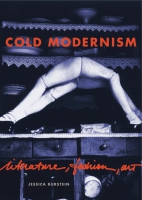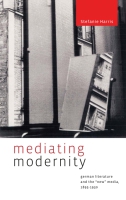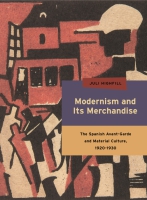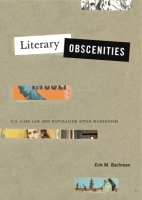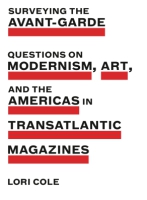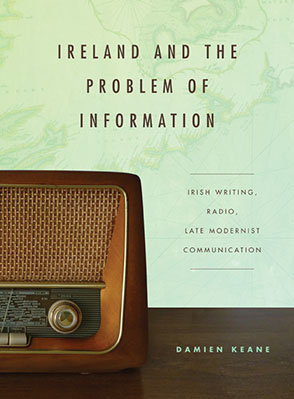
Ireland and the Problem of Information
Irish Writing, Radio, Late Modernist Communication
Damien Keane
Ireland and the Problem of Information
Irish Writing, Radio, Late Modernist Communication
Damien Keane
“Ireland and the Problem of Information boldly reconstellates late modernism, wartime propaganda, radio and sound recording, and post-independence Irish culture. Damien Keane clears the period of received narratives about modernist formal innovation and the auratic voice. In their place he sets up a cultural field in which social knowledge is produced—and, increasingly, knows itself to be produced—through dispersed, often agonistic processes of mediation. Far from being a belated entrant into this moment, the Irish cultural field emerges here as its advance guard, ‘an early indicator of the antagonistic cooperation that has since come more generally to structure the cultural field of the “information age.”’ This is a rigorously researched book, reflecting Keane’s deep fascination with his subject.”
- Media
- Description
- Reviews
- Bio
- Table of Contents
- Sample Chapters
- Subjects
Damien Keane is the winner of the 2015 Rhodes Prize for Literature and Language from the American Conference for Irish Studies.
“Ireland and the Problem of Information boldly reconstellates late modernism, wartime propaganda, radio and sound recording, and post-independence Irish culture. Damien Keane clears the period of received narratives about modernist formal innovation and the auratic voice. In their place he sets up a cultural field in which social knowledge is produced—and, increasingly, knows itself to be produced—through dispersed, often agonistic processes of mediation. Far from being a belated entrant into this moment, the Irish cultural field emerges here as its advance guard, ‘an early indicator of the antagonistic cooperation that has since come more generally to structure the cultural field of the “information age.”’ This is a rigorously researched book, reflecting Keane’s deep fascination with his subject.”
“In Ireland and the Problem of Information, Damien Keane uses his pioneering intelligence and crackling wit to explore new territories carved out from the known spaces of Irish literature, circum-Atlantic culture, and sound studies. Tuned to markets and networks rather than ‘myths and symbols,’ the book gives us a fresh model of Irish modernism and extends that field’s boundaries to include the Irish Republic’s place in a global mediascape. Keane has done the archival legwork necessary to establish a literary, legal, and social prehistory of the digital age framed against the entire historical arc of the Irish Atlantic. In his hands, for example, Beckett’s mature fiction stands out as a meditation not on individual consciousness in the nuclear age but on the circulation and electrification of social knowledge in the epoch of mass media. Just as provocatively, Keane rereads the highly coded style of Irish modernism, rooting it not in the individual or atavistic genius of Yeats, Joyce, and company, but in the peculiarly intense culture of secrecy attached to church, army, and state in the Irish colony and the Irish Republic. For readers who want to know what Irish studies or modernist studies can do once they finally detach from their shopworn rosters of great works and plunge fully into transnational, mixed-media histories of culture, this is the book to read.”
“Theoretically sophisticated, solidly grounded in archival work, and entertainingly cantankerous, Damien Keane’s Ireland and the Problem of Information serves as both an important intervention in Irish studies and the next necessary step in the recasting of modernist studies through the lens of media.”
“Each chapter of Ireland and the Problem of Information is meticulously researched. Every page is written with brio and wry humor. This book extends the boundaries of current studies in Irish literature by locating texts within a transnational, acoustic, and enhanced field of cultural production.”
“Damien Keane’s beautifully crafted Ireland and the Problem of Information captures some of the staticky buzz of transnational intersecting writings and radio transmissions in the mid-twentieth century. He traces, often brilliantly, how events and situations change their meanings as they cross borders, complicating our understanding of the causality of transference of information.”
Damien Keane is Associate Professor of English at the University at Buffalo.
Table of Contents
Acknowledgements
Introduction: The Problem of Information
1. The Remediation of Waves
The Crisis of Internationalism
Ensemble and Microphone
Auratic Listener and Fascist Violin
2. Dirty Work in New York
The Fourth Point
Going Forth
Books of the Hour
3. The Irish Free Zone
Silence
Stillness
Secrets
4. Radio Pages
On the Page
On the Air
On the Line
Conclusion: Compression and Cross-fade
Texts for Something
Vinyl for Nothing
Notes
Bibliography
Index
Introduction
The Problem of Information
Just after the end of the Second World War, a small, plain booklet titled Ireland’s Stand was published in Dublin collecting a selection of speeches delivered by Eamon de Valera, the Irish Taoiseach, during the six years of conflict. Drawn from press interviews, statements made in Dáil sessions, and radio broadcasts, the speeches outline the evolving rationale for the state’s wartime policy of neutrality. As its title suggests, the booklet as a whole was also meant to defend the policy in the postwar world, in which the niceties of national self-preservation, practiced and articulated seemingly without regard for larger ideological or geopolitical alignments, were receiving an even less welcome hearing than they had in the decade before the war. Indeed, for many officials and opinion makers in the victorious Allied nations, Irish neutrality remained all but synonymous with collaboration. While not an official government publication, Ireland’s Stand was nevertheless produced within the ambit of the Government Publications Office and distributed—especially to interested foreign readers—through the Government Information Bureau. With its cream-colored cover, the booklet can thus be rightly viewed as a form of off-white propaganda, poised between openly announcing and quietly dampening its source. The opening paragraph of its anonymous introduction manifests this affiliation: “The years 1939 to 1945 were years of national tension in Ireland. They brought forward in their most acute form questions of international relationship, defense, supplies and food production. Happily, the Irish people and the Irish Government were at one in these grave matters, and by that unity and the discipline and self-sacrifice of the community as a whole the many perils in the situation were avoided and Irish neutrality was maintained.” Balancing the peril, gravity, and tension of the war years against the communal self-determination both secured and represented by neutrality, the rhetoric of the passage underscores what had already become the familiar official image of “Ireland’s stand”: that of singular perseverance amid exceptionally dangerous impositions on the state’s independence. As propaganda, the passage provides an effective set of strong terms and associations with which to inform the meaning of neutrality.
Because of the familiarity of this image, it is fundamental to note the peculiar idiom of the passage, which on its own seems to clash with the conventional harmonics of Irish neutrality. Between grim poles of global devastation and national preservation, the passage turns on the word “happily,” a mediating term meant to convey grateful and fortunate relief, but also carrying the sense of secure and appropriate contentment. Given that the war years in Ireland have since become characterized by their unremitting claustrophobia and horizonless isolation, this turn is at best odd. Yet it chimes with what is perhaps the most famous Irish statement of the war years, a speech made by de Valera that is not, however, collected in Ireland’s Stand: his St. Patrick’s Day broadcast of 1943. Delivered on the occasion of the fiftieth anniversary of the founding of the Gaelic League, the speech has come to exemplify the insular vision of Irish life, its second paragraph alone standing as the regressive essence of what passes for “de Valera’s Ireland”:
Acutely conscious though we all are of the misery and desolation in which the greater part of the world is plunged, let us turn aside for a moment to that ideal Ireland that we would have. That Ireland which we dreamed of would be the home of a people who valued material wealth only as the basis of right living, of a people who were satisfied with frugal comfort and devoted their leisure to the things of the spirit—a land whose countryside would be bright with cosy homesteads, whose fields and villages would be joyous with the sounds of industry, with the romping of sturdy children, the contests of athletic youths and the laughter of comely maidens, whose firesides would be the forums for the wisdom of serene old age. It would, in a word, be the home of a people living the life that God desires that man should live.
The devotion paid by later critics to this single paragraph of a single broadcast, as though de Valera never uttered another word into a microphone, is almost touching. With some justification, de Valera has been taken to task for flattening the diversity of Irish experience in articulating a traditionally sanctioned, rurally based conception of society, one apparently unable to comprehend happiness outside the confines of field, family, church, and language. But this reading comes at the cost of ignoring the broadcast’s attention to the risks of increasing stratification amid scarcity, to the possibility of concentrating privilege with those already possessing it. Its vision of self-sufficient contentment based on shared commitments to health, welfare, and respect is indeed all the more plangent for its conditionality. Hardly the outline of a program of national redistribution, the speech nonetheless understands the “ideal Ireland that we would have” by recognizing the very real constraints on its achievement.
These constraints are spelled out in the other fourteen paragraphs of the broadcast, in which the ongoing pursuit of an ideal self-determination is rhetorically couched among the all-too-real challenges to Irish independence. The speech explicitly identifies the latter as the material conditions of the war, what the second paragraph names as the “misery and desolation in which the greater part of the world is plunged.” Closing the speech in Irish, de Valera again sounds this note in its final paragraph, contrasting the “calamity” (anachain) and “misfortune” (mí-ádh) brought by the war with the “protection” (scáth) and “shelter” (dídean) afforded by non-belligerence. Within this frame, the “Ireland which we dreamed of” represents not the idealist renunciation of the realities of the world, but a momentary inward “turn” toward alternative possibilities that is itself necessitated by those realities. Taken in its entirety, the speech insists on this relationship, and the point becomes even sharper when the speech is read in the context of the policy statements collected in Ireland’s Stand. Nowhere in the text of the St. Patrick’s Day broadcast does the word “neutrality” appear, and this fact might account for why it was not included in a booklet partly aimed at foreign readers; yet in the speech, neutrality everywhere serves as the term mediating between “misery and desolation” close at hand and the possibility of future contentment. In response to the German invasion of the neutral Low Countries in May 1940, de Valera made this very point: “You know that we have declared our neutrality and proclaimed our desire and intention to save our people from the horrors of this war. Small countries like ours had the same desire. Some of these small countries had no greater wish than not to be involved in the war. They have been involved against their will, not having done anything as far as we can see to deserve what has happened them. The fact that we want to keep out of this war may not be sufficient to save us.” As a real and dynamic practice, neutrality—and not the invocation of an ideal Ireland—embodied the response to wartime constraints on independence. In this moment, safeguarding Irish autonomy thus hinged on the acute consciousness of the wider crises of self-preservation ushered in by the war.
One marker of these crises can be gleaned from the radiophonic origin of the speech. In its first paragraph, de Valera notes that “before the present war began I was accustomed on St Patrick’s Day to speak to our kinsfolk in foreign lands, particularly those in the United States,” whereas he now speaks to a primarily domestic audience. This note refers to the severely curtailed Irish shortwave service, whose operation during the war was compromised by electricity shortages and the inability to obtain more powerful transmitting equipment from abroad. Rather than understanding global communications as the harbinger of a McLuhanite “global village,” with its giddy faith in universal connectivity, the broadcast’s awareness of material impingements on transmission and reception is more akin to Raymond Williams’s diagnosis of a later phase of such communication networks:
The new technologies of cable and satellite, because they can be represented as socially new and therefore as creating a new political situation, are in their commonly foreseen forms essentially paranational. Existing societies will be urged, under the excuse of technical reasons, to relax or abolish virtually all their internal regulatory powers. If the price includes a few unproblematic legalities, or gestures to “community” interests, it will be paid. . . . The real costs, meanwhile, will be paid elsewhere. The social costs and consequences of the penetration of any society and its economy by the high-flying paranational system will be left to be paid or to be defaulted on by surviving national political entities.
Turned necessarily inward, the broadcast manifests in its material conditions of production and reception an early, if inchoate, instance of the coercive stratification identified by Williams. As a matter of transmission and reception, that is, the broadcast objectifies conditions of uneven access that were particularly acute during the war, but have since become naturalized as the structure of technological modernity itself.
A final word remains in order about the St. Patrick’s Day broadcast. Much of the subsequent criticism directed at its invocation of an ideal Ireland has centered on the depiction of “comely maidens.” The locution was already timeworn in 1943, but still testified in all its mustiness to the deeply conservative role assigned to women in the 1937 Constitution. While indefensible, the word “comely” has become critical shorthand for the repressive denial of women’s lived experience in “de Valera’s Ireland,” a monolithic tag used to convey the outline of a paleolithic social environment. In this, the specification of the many privations endured by Irish women is not well served by appealing to a heuristic device drawn from a single phrase in a single broadcast. In the present context, this idealizing compression is especially noteworthy, since the word “comely” seems to appear only in the printed text of the broadcast. In de Valera’s recording of the speech, he instead invokes “happy maidens.” This recording may not be a transcription recording of the live broadcast, but rather a version of the speech pressed to gramophone disc for release in the Irish diaspora. Whether of the live broadcast or not, this recording nonetheless represents an important “turn” outward and, like Ireland’s Stand, suggests an alertness to modern channels of dissemination that runs counter to received images of cloistered otherworldliness. The monumentalization of the St. Patrick’s Day speech not only ignores this historical context, but also bases itself on the presumed singularity of what circulated in multiple forms. It is therefore precisely the discrepancy among the intermedial iterations of the speech that demonstrates the precariousness of Ireland’s position in the world. The nimbleness of the state’s neutrality policy here finds its ground. In place, then, of the singular hallmark reliant on the misrecognition of an isolated paragraph for an auratic voice, the St. Patrick’s Day speech discloses a field of mediation. Produced by how people live as they do and the reasons why they live as they must, this field has as its unlikely keyword, at times rendered all but inaudible, the word “happy.”
With its anxieties and supplications couched only as the touchstones of an era gratefully superseded, de Valera’s homely vision may seem an odd place to begin a study of the problem of information. Yet this problem names the practical contradiction born of the scarcity of information coupled with its overabundance; and in this way, it opens on to a much more pervasive quandary at work in the circulation of the speech and in its subsequent reception. As such, the opening set piece anticipates the questions of transmission and reception that animate the chapters of this book, in the final pages of which the charged implications of the keyword “happy” will be explicitly addressed. With its center located in the global ideological contests of the Second World War, this book argues that Irish cultural production of the period cannot be understood outside the conflict’s mediating relations, but instead must be approached as having been actively constituted by their realization. The problem of information is therefore understood to be an international predicament that has specific manifestations in Irish contexts. At the same time, the book does not assume the congruence of cultural field and national or geographical territory. Already effected by emigration and partition, this dissociation was dramatically extended and retempered by the emergence of an international media economy increasingly premised on the national consequences of extra- and paranational forces. The rise of intercontinental shortwave broadcasting, the twinned refinements of propaganda technique and analysis, the growth of and competition among press services and news agencies, and the work of disparate networks of translation and dissemination all had a transformative impact not only on diplomacy and statecraft, but also on everyday practical senses of worldly engagement, cosmopolitan style, national allegiance, and communal security. While attention to these changing relations helps to historicize this moment, Ireland and the Problem of Information nevertheless considers as the stakes of its investigation the effort, in the words of Terry Eagleton, “to grasp history as structured material struggle,” in order that the political continuities of this earlier moment with our own “information age” become less mystified.
Also of Interest
Mailing List
Subscribe to our mailing list and be notified about new titles, journals and catalogs.
